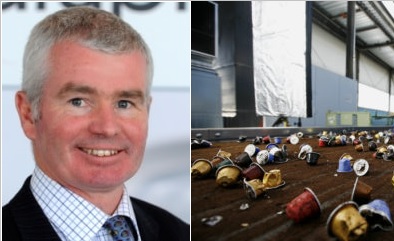In this opinion piece, Rick Hindley, who joined coffee pod recycling scheme Podback as executive director in May 2021, discusses how the company is tackling coffee pod recycling.
OPINION: Around 61% of the UK population say they have limited their consumption of single-use items over the last 12 months. Much of this hinges on making small changes to day-to-day life, from switching out plastic water bottles to buying second-hand clothes.

One small change that people have been looking for is a simpler and easier way to recycle their coffee pods. In fact, 90% of coffee pod consumers say they would like a solution that enabled them to recycle their pods alongside their usual household recycling.
Podback, an end-to-end category wide recycling solution for coffee pods, has been created to respond to that demand.
Established by Nestle and Jacob Douwe Egberts UK, the scheme provides simple and easy ways to recycle pods of all participating brands, whether they are plastic or aluminium.
At the heart of the scheme is the ability for consumers to have their pods collected at the kerbside, with Podback working in partnership with individual local authorities across the UK to make this a reality. Residents simply have to leave their recycling bags, filled up with used pods, outside along with their household waste to be collected. All pods will then be processed and recycled in the UK.
As well as making the process easy for consumers, our aim is to make this as streamlined as possible for local authorities. Podback enables coffee pods to be collected as part of regular waste collections, rather than needing any additional services or logistics to be set up by councils.
Collections
Collections in Cheltenham borough council and South Derbyshire district council are already up and running, with 200,000 residents already able to sign up and benefit from the service. Chichester district council is currently trialling the scheme, with at least four other authorities set to join by the end of the summer and even more by the Autumn.
We’ve also seen new brands come on board since launch. Back in May, CruKafe became the first independent coffee brand to join Podback, and we’re in talks with other brands about expanding further.
Not only does Podback represent an effective recycling solution for coffee pod drinkers, we believe it also provides an effective blueprint for cross-industry collaboration to tackle waste, which could be replicated by other waste streams in the future.
As we move forward with growing the scheme, one of our key priorities is partnering with more councils to bring this service to their local communities.
We know that the last 18 months have been tough for so many local councils and leaders, and we’re pleased with the engagement and conversations we’ve had so far. But we’re striving to make this available much more widely across the UK, which means having more councils on board. The aim is to make it as easy as possible for consumers to use the scheme and, ultimately, for every pod enjoyed to be recycled.
Podback has united industry rivals, and we hope we can unite local authorities across the UK to support us in delivering on this ambition.
Process
Pods are predominately made of plastic, but also contain a small amount of aluminium.
While pods are currently technically recyclable, consumers not part of the kerbside system must order a recycling bag for the pods and once full, print off a label and take it to a collection point.
According to Podback, the sorting and reprocessing stages are overseen fully by its partners in the UK, meaning it has “complete visibility over what happens to the pods”.
After collection, the coffee pod materials will be separated from the used coffee grounds. The plastic and aluminium pods will be processed separately in the UK, Podback says, with plastic pods producing “high grade plastic pellets which will be used by manufacturers to produce high grade plastic items”, while the aluminium ingots can create beverage cans, car spare parts and “other everyday objects”.
The coffee grounds will go through anaerobic digestion producing a combination of biogas and soil improver.
Aluminium will be processed by Tandom Metallurgical Group Ltd in Congleton, near Stoke-on-Trent. Plastic pods will be reprocessed by Roydon in Swinton, near Manchester.
The post Opinion: ‘Podback is uniting industry rivals for effective recycling’ appeared first on letsrecycle.com.
Source: letsrecycle.com Plastic


